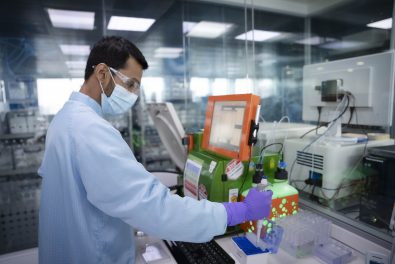With advances in sequencing technologies, researchers are generating massive amounts of genomic data which requires efficient storage, management, and processing.
In the field of bioinformatics, handling big data is a challenge that researchers face on a daily basis. This creates bottlenecks in research flows where the management of large data sets becomes imperative to the quality of the analysis and interpretation of the data.
Advances in sequencing technologies means that researchers are generating massive amounts of genomic data that require efficient storage, management, security and pre-processing. In this post, we will discuss the challenges of handling large data sets referred to as big data in bioinformatics and explore some potential solutions to address these challenges.
Volume and sharing of data
One of the biggest challenges of handling big data in bioinformatics is the sheer volume of data generated – with modern sequencing technologies, researchers can generate terabytes of data in just a single experiment. Storage of this data needs to be considered by the researcher, as it can often have unforeseen cost implications as existing storage solutions, such as external hard drives and compression, may not be able to handle these large amounts of data.
In an increasing interconnected research network that can even span countries, local access to data is becoming inconvenient. To address this challenge, researchers are turning to cloud computing and distributed storage solutions, which allow for efficient storage and retrieval of large amounts of data.
Cloud storage solutions offer the potential for increased collaboration as the data is centralised and can be accessed remotely and easily. They are also supported by a flexible infrastructure, so the cloud can grow as the data sets do, without compromising data security and management. Establishing a cloud storage solution has a cost implication, and it’s important that the software is maintained and monitored for malware and cyber attacks to maintain data security.
Quick processing
Another challenge of handling big data in bioinformatics is processing this data quickly and effectively to overcome any analysis bottlenecks. With such large amounts of data, traditional processing methods, which are usually user led, may take too long to analyse the data efficiently. One way to overcome this is to pre-process to clean and normalise the data.
Some data may be required to operate on multiple platforms, and so the ability to transform the data into the format required is vital to collaborative research. To address this, researchers are turning to parallel processing and distributed computing techniques, which allow for efficient processing of large amounts of data across multiple computing nodes. This creates high-performance computing which can accommodate the large data sets produced by genomic sequencing and allows researchers to analyse their data more effectively, often supported by cloud computing.
Data quality
Researchers are also facing challenges related to data quality and accuracy. Poor data quality can lead to incorrect results, misinterpretations and wasted time. Quality control methods can identify and correct errors in the data using data management software, including data normalisation techniques, data cleaning which can correct for variations in data due to technical or biological factors, and outlier detection methods, which can identify and remove data points that are likely to be erroneous. Automation of this software with rule-based algorithms can improve the efficiency of this software and save time during the pre-processing and analysis stages.
Keeping data safe
Cybersecurity of large data sets is paramount to the integrity of the data generated. The process of monitoring large data sets for malware attacks can be time-consuming and counterproductive to the research, when a researchers attention needs to be focused on the analysis of the data. Cloud based systems will often offer automated network monitoring that will detect security anomalies, and authentication methods and user access controls are valuable for accessing data and creating auditable trails.
Data loss can be malicious or simply accidental, and as ‘big data’ becomes ‘even bigger data’ researchers will need to monitor for data loss through regular auditing to reduce the impact of any loss. It’s important that security researchers have an awareness of cyber security, both in academia and private sector research.
Handling ‘big data’ in bioinformatics is a significant challenge that researchers face as they generate massive amounts of genomic data with modern sequencing technologies. But, with the use of cloud computing, distributed storage and processing and quality control methods, researchers can address these challenges and make meaningful advances in the field of bioinformatics.
Researchers are already adapting to these challenges by embracing the FAIR principles (Findable, Accessible, Interoperable and Resusable) in data management at the beginning of their experimental design. As the field continues to grow and evolve, researchers will need to continue to adapt and develop new solutions to handle the challenges of big data.
It’s important that these challenges are acknowledged and addressed at the base of a researchers learning on an institutional level by academia. Management of big data will need to be incorporated into the learning of genomic sequencing techniques so that the high standards of research and be maintained and the boundaries of our understanding can be expanded.
Do you need advice or help with the storage, analysis, quality or security of big data? Biomatics’ experienced team can offer a range of Bioinformatics Services to support researchers and organisations – get in touch!



